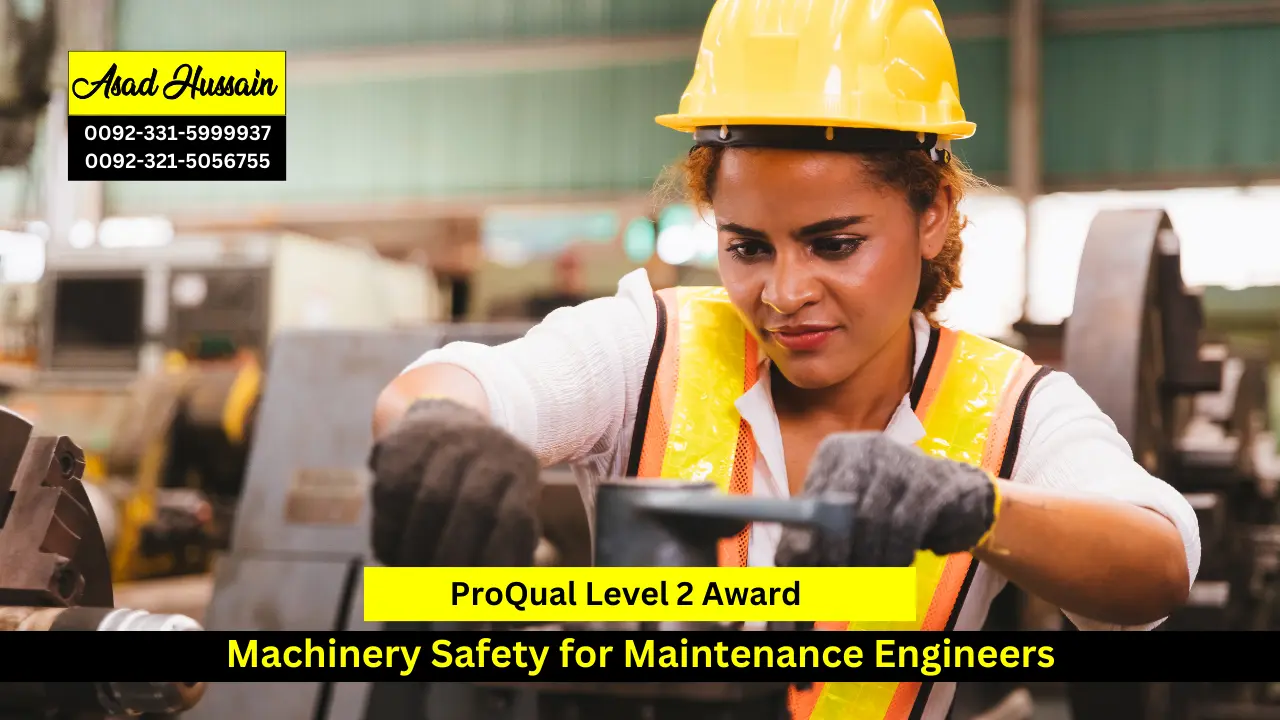The Proqual Level 2 Award in Machinery Safety for Maintenance Engineers is a dynamic and essential qualification designed to equip maintenance engineers with the knowledge and skills required to ensure the safe and efficient operation of industrial machinery. In a world driven by technology and automation, machinery maintenance has never been more critical, and this program is tailored to meet the exacting demands of the industry.
This award is a gateway to excellence, offering a comprehensive understanding of machinery safety, risk assessment, and maintenance protocols. It delves into the intricacies of modern industrial equipment, empowering maintenance engineers to not only repair and service machinery but also to safeguard both themselves and their workplaces from potential hazards. The course is both practical and theoretical, providing hands-on experience alongside a solid theoretical foundation.
What sets this award apart is its industry relevance. The curriculum is designed in close consultation with industry experts, ensuring that graduates are equipped with the latest knowledge and skills required for machinery safety and maintenance. This ensures that they are well-prepared to address the evolving challenges of the field.
The Proqual Level 2 Award is not just about acquiring a certificate but enhancing career prospects. Graduates of this program are highly sought after in various industries, including manufacturing, construction, and logistics. Employers value the competence and commitment that comes with this certification, making it a valuable asset for career growth.
In summary, the Proqual Level 2 Award in Machinery Safety for Maintenance Engineers is your passport to a safer, more prosperous career in machinery maintenance. It’s a dynamic and attractive opportunity to gain in-depth knowledge, hands-on experience, and the recognition you need to excel in this crucial field. Don’t miss the chance to become a machinery safety expert, enhancing your career prospects and making a real impact in the industries that rely on your expertise.
we are offering ProQual Qualifications in Association with ICTQual ( Inspire College of Technologies Uk).
Program Highlights
To achieve the Proqual Level 2 Award in Machinery Safety for Maintenance Engineers: Candidates must complete the following single Mandatory unit of 50 Guided Learning Hour.
Mandatory units
Machinery Safety for Maintenance Engineers
Here are typical entry requirements:
- Age: There is usually no specific age requirement to enroll in the Proqual Level 2 Award, but you should be of working age, typically 16 years or older.
- Educational Requirements: The entry requirements may vary depending on the institution or training provider. However, Level 2 qualifications are generally designed for individuals with a good basic education, which may include a minimum of Level 1 qualifications or equivalent. Some prior knowledge of engineering or maintenance may be advantageous but not always mandatory.
- Work Experience: While not always required, having relevant work experience in maintenance engineering, machinery operation, or a related field can be beneficial. Many individuals pursuing this qualification are likely to be currently employed or seeking employment in a relevant industry.
- English Language Proficiency: Depending on the awarding body and the institution, English language proficiency may be required, especially if the program involves written assessments and coursework. Proof of English language proficiency may be requested, such as a language proficiency test (e.g., IELTS, TOEFL).
- Health and Safety: Given the focus on machinery safety, some institutions may require participants to have a basic understanding of health and safety principles. This may be assessed through a pre-course interview or test.
- Pre-Requisite Qualifications: In some cases, Level 1 qualifications or equivalent certifications related to machinery, maintenance, or engineering may be required as a prerequisite to enroll in the Level 2 Award.
- Interview or Assessment: You may need to attend an interview or undergo an initial assessment to ensure that the program is suitable for your current knowledge and skills.
Join us on this path of transformative growth and take the first step towards becoming a strategic leader in health and safety. Your dedication and commitment can unlock a world of opportunities and impact
The Proqual Level 2 Award in Machinery Safety for Maintenance Engineers is designed to provide learners with a comprehensive understanding of machinery safety and maintenance practices. Upon successful completion of this qualification, learners should be able to demonstrate the following learning outcomes:
- Understanding Machinery Safety Principles:
- Explain the fundamental principles of machinery safety, including risk assessment and hazard identification.
- Describe the legal requirements and regulations related to machinery safety.
- Identifying Machine Hazards:
- Identify and classify different types of machine hazards, such as mechanical, electrical, and ergonomic hazards.
- Analyze and assess potential risks associated with machinery in the workplace.
- Risk Assessment and Management:
- Conduct risk assessments for various machines and equipment.
- Develop and implement risk control measures to minimize or eliminate hazards.
- Understand the hierarchy of risk control measures, including elimination, substitution, engineering controls, administrative controls, and personal protective equipment.
- Safe Operating Procedures:
- Develop safe operating procedures for machinery, considering best practices and manufacturer recommendations.
- Explain the importance of standard operating procedures (SOPs) in maintaining a safe work environment.
- Maintenance and Inspection:
- Perform routine maintenance tasks on machinery to ensure proper functioning and safety.
- Conduct inspections to identify and address potential issues before they become hazards.
- Emergency Response and Incident Management:
- Describe emergency response protocols in the event of machinery-related accidents or malfunctions.
- Understand the steps to take when incidents occur and the importance of reporting and investigation.
- Machine Guarding and Safeguarding:
- Evaluate and implement appropriate machine guarding and safeguarding techniques to prevent access to hazardous areas.
- Explain the various types of machine guards and their functions.
- Electrical Safety:
- Identify electrical hazards associated with machinery.
- Apply electrical safety procedures and practices in maintenance and repair tasks.
- Communication and Training:
- Communicate machinery safety information effectively to colleagues and team members.
- Contribute to the development of safety training programs for maintenance engineers and operators.
- Documentation and Record-Keeping:
- Maintain accurate records of machinery maintenance, inspections, and incidents.
- Understand the importance of proper documentation for compliance and continuous improvement.
- Continuous Improvement:
- Demonstrate a commitment to ongoing learning and improvement in machinery safety and maintenance.
- Participate in safety audits and evaluations to identify areas for enhancement.
The “Proqual Level 2 Award in Machinery Safety for Maintenance Engineers” is designed for individuals with specific career goals and educational needs. Here are the key points about who this course is intended for:
- Maintenance Engineers: This course is primarily intended for individuals working as maintenance engineers. It equips them with the knowledge and skills required to ensure machinery safety in their maintenance tasks.
- Entry-Level Professionals: It is suitable for those at the entry level of their maintenance engineering career, providing foundational knowledge in machinery safety.
- Industry-Specific: The course is relevant to a wide range of industries, including manufacturing, construction, automotive, and more, where machinery safety is a critical concern.
- Health and Safety Professionals: It’s also beneficial for health and safety professionals who want to specialize in machinery safety within their workplace.
- Employers and Managers: This course can be valuable for employers and managers who want to ensure their maintenance engineering teams are well-versed in machinery safety principles.
- Career Advancement: Individuals looking to advance their careers in maintenance engineering or related fields will benefit from this certification.
- Regulatory Compliance: Professionals seeking to stay compliant with industry regulations and safety standards can find this course essential.
- Technical Personnel: Those involved in equipment maintenance, troubleshooting, and repair can enhance their skills and knowledge.
- Skill Enhancement: The course is for those who want to improve their understanding of machinery safety, including risk assessment, preventive measures, and emergency response.
- Continuous Professional Development: It’s suitable for individuals committed to their professional development, as it adds a valuable qualification to their portfolio.
- Safety Advocates: Individuals who are passionate about safety and minimizing workplace accidents will find this course aligns with their goals.
- Learning Enthusiasts: Anyone with an interest in machinery safety and a willingness to learn can benefit from this course.







